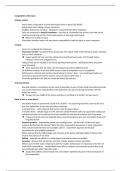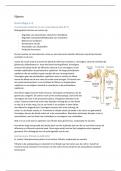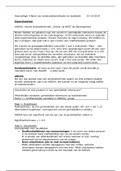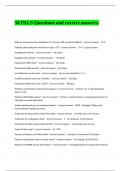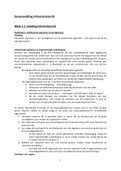Composition of the epics
Literary context
- Poems were composed by a Greek who lived in Ionia in about 725-700 BC
- Called homer but nothing is known about him
- Tradition that homer was blind – blindness is associated with divine inspiration
- Epics are composed in dactylic hexameter – each line of a hexameter has six feet, each foot can be
made up of one long and two short vowel sounds, or two long vowel founds
Allows for variation of pace
- Discussions whether homer was one person responsible for both the epics or many composers
Context
- Poems are set during the trojan war
- Mycenaean period – last phase of the bronze age, from about 1,600-1,100 centred on palace societies
such as that in Mycenae
Homer would not have seen the evidence but must have been aware of it through stories –
Mycenae is the home of Agamemnon
- Setting of the epics is broadly in the bronze age Mycenaean period – still debated when the poem
came into being
Some arguments that the texts were developed over time by different poets
- No definitive evidence in the text which means a date of composition can be established
- References to materials and practices which belong to homer’s time – iron mentioned, bodies are
cremated as opposed to buried, warriors carry two spears rather than 1
- Generally agreed that the Iliad was composed before the odyssey
Oral transmission
- Iliad and odysseys’ composition are the result of hundreds of years of tales being transmitted by bards
- Can assume that homer expected those who listened to the epics to already be familiar with the
trojan war stories
Plunges into the middle of the stories and there is no filling in of details from past events
Work of one or many poets?
- Oral poetry leaves no permanent record of its creation – not surprising that there seems to be more
than one explanation of how the epics were composed
- In ancient times – critics believed that homer wrote the poems down
- In modern times – debate began in 1795 (German scholar Friedrich wolf) and argued that writing was
unknown to homer so it would not have been possible for one poet to compose such long works
Proposes that the epics had originally been unconnected poems and were not written down until
long after homer
- Homeric question – longstanding debate surrounding homer – did he exist? Did the same poet
compose the Iliad and the odyssey? Were the epics composed by one person or many individuals?
- Many scholars believed there were multiple authors – based their argument on the plot
inconsistencies and multiple repetitions
- Others claimed that the skilful design and structure of the poems and high quality of literary style
must be the product of one mind
- Epithet – word/phrase added to a name/object to denote its nature or qualities
- Formulae – phrases that slot into the narrative, familiar markers of time and rituals
- Milman parry (1930) made comparisons with the modern performance of oral poetry in the form of
south Slavic compositions – showed bards were able to compose and improvise because they used
pre-existing phrases which fitted the metre
Argued that epithets and formulae were not random repetitions but part of the architecture of
the composition
Literary context
- Poems were composed by a Greek who lived in Ionia in about 725-700 BC
- Called homer but nothing is known about him
- Tradition that homer was blind – blindness is associated with divine inspiration
- Epics are composed in dactylic hexameter – each line of a hexameter has six feet, each foot can be
made up of one long and two short vowel sounds, or two long vowel founds
Allows for variation of pace
- Discussions whether homer was one person responsible for both the epics or many composers
Context
- Poems are set during the trojan war
- Mycenaean period – last phase of the bronze age, from about 1,600-1,100 centred on palace societies
such as that in Mycenae
Homer would not have seen the evidence but must have been aware of it through stories –
Mycenae is the home of Agamemnon
- Setting of the epics is broadly in the bronze age Mycenaean period – still debated when the poem
came into being
Some arguments that the texts were developed over time by different poets
- No definitive evidence in the text which means a date of composition can be established
- References to materials and practices which belong to homer’s time – iron mentioned, bodies are
cremated as opposed to buried, warriors carry two spears rather than 1
- Generally agreed that the Iliad was composed before the odyssey
Oral transmission
- Iliad and odysseys’ composition are the result of hundreds of years of tales being transmitted by bards
- Can assume that homer expected those who listened to the epics to already be familiar with the
trojan war stories
Plunges into the middle of the stories and there is no filling in of details from past events
Work of one or many poets?
- Oral poetry leaves no permanent record of its creation – not surprising that there seems to be more
than one explanation of how the epics were composed
- In ancient times – critics believed that homer wrote the poems down
- In modern times – debate began in 1795 (German scholar Friedrich wolf) and argued that writing was
unknown to homer so it would not have been possible for one poet to compose such long works
Proposes that the epics had originally been unconnected poems and were not written down until
long after homer
- Homeric question – longstanding debate surrounding homer – did he exist? Did the same poet
compose the Iliad and the odyssey? Were the epics composed by one person or many individuals?
- Many scholars believed there were multiple authors – based their argument on the plot
inconsistencies and multiple repetitions
- Others claimed that the skilful design and structure of the poems and high quality of literary style
must be the product of one mind
- Epithet – word/phrase added to a name/object to denote its nature or qualities
- Formulae – phrases that slot into the narrative, familiar markers of time and rituals
- Milman parry (1930) made comparisons with the modern performance of oral poetry in the form of
south Slavic compositions – showed bards were able to compose and improvise because they used
pre-existing phrases which fitted the metre
Argued that epithets and formulae were not random repetitions but part of the architecture of
the composition


